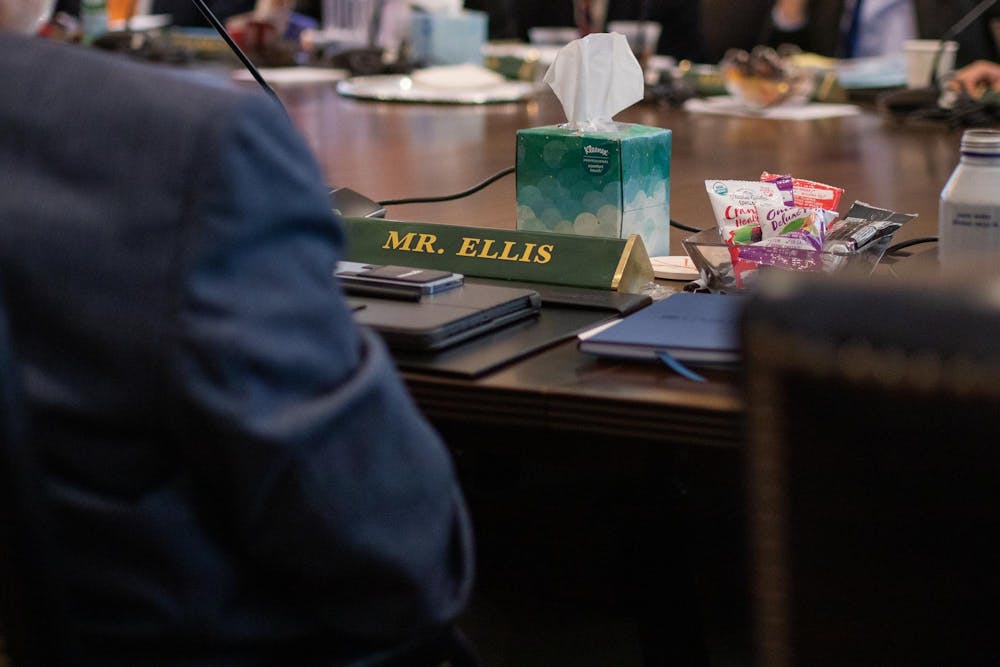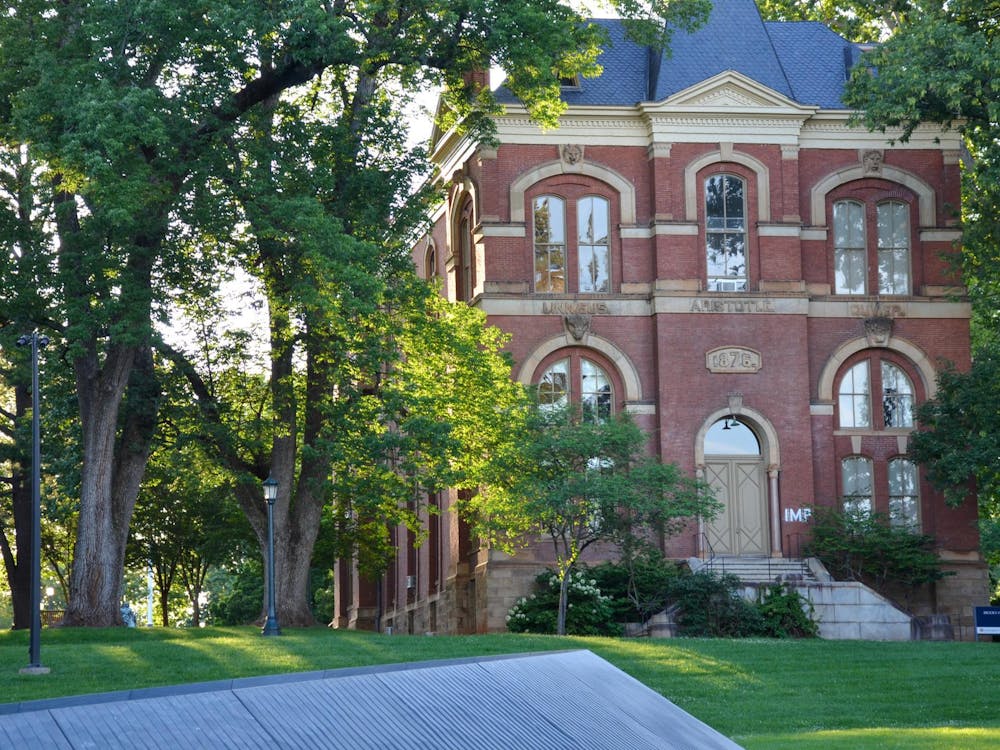The Cavalier Daily spoke with former Board of Visitors member Bert Ellis, who was fired by Virginia Gov. Glenn Youngkin March 26, about the goals he had hoped to accomplish as a member, many of which he believes remain unachieved. These goals included key priorities of removing Diversity, Equity and Inclusion initiatives, firing President Jim Ryan, lowering costs and reducing the University’s operating budget and rejuvenating the Honor system.
Class of 1975 alumnus Ellis was appointed to the Board in 2022 amid objections from students and community members — following his appointment, his texts, in which he threatened to “raise hell with the BOV,” were obtained from the University via a Freedom of Information Act request in 2023 and published by the Washington Post.
In an interview, Ellis spoke about Youngkin’s recent decision to remove him from the Board, which according to Ellis, Youngkin said was based not on Ellis’s views but his methods of expressing these views. According to Ellis, the governor supported his work on the Board, but said Ellis’s style was too “caustic.” While Youngkin initially asked him to resign for personal reasons, Ellis explained that he felt doing so would not be honest, and instead allowed the governor to fire him from his position on the Board.
While Ellis entered the Board with certain priorities in mind, he said that most had not been accomplished during his term, without a majority of Youngkin appointees on the Board.
“Quite frankly, none of our goals have played out yet because we didn't have the votes on our side of the ledger to make any changes until really about the last three months,” Ellis said. “... It was a Democratic Board for basically the last 10 years … and they had the votes. So we could talk about it, but we couldn't change much.”
Members are appointed each year, for four-year terms, by Virginia’s governor — Youngkin appointees have only held a majority of the 17 seats on the Board since mid-2024. Previously, the majority of members had been appointed by former Democratic Gov. Ralph Northam.
Although Ellis said that he had not had as much of an impact as he wished, third-year College student Keoni Vega said that Ellis had led the Board to take actions which have negatively impacted students.
“I think the Board's actions, especially this past year, have been particularly heinous, especially under the vocal leadership of Bert Ellis,” Vega said.
Despite the challenges posed by what he perceived as a partisan divide on the Board, one of Ellis’s main priorities as a member was to remove DEI infrastructure from the University — in early March, just before Ellis’s removal, the Board voted unanimously to dissolve the Office of Diversity, Equity, Inclusion and Community Partnerships despite objections from students. This decision was made in compliance with President Donald Trump’s executive order to end DEI programs at public institutions.
“I did not think [DEI] was a positive influence on the University,” Ellis said. “I think it's an unnecessary expense that has had no positive value and [has not] moved the needle on anything that it was set up to do.”
While Ellis said that the Office should be removed to reduce costs, Vega also spoke on the impact of the Board’s decision, arguing that the dissolution would have negative long-term effects for the community.
“[I think] that a lot of the anti-DEI stuff is just hidden racism. It's a way to rebrand hatred towards other people,” Vega said. “… I think it's a really ugly and dangerous path that we're currently on.”
Although the Board did vote to dissolve the Office, the resolution also had a statement affirming the value of diversity at the University. Ellis said that DEI initiatives have not fully been removed from the University noting that University President Jim Ryan had sent the Board a report in early April, but claimed that Ryan had refused to carry out the Board’s orders.
The Cavalier Daily requested Ryan’s report from University Communications and later submitted a request via FOIA, but these requests were denied on both occasions. University Communications did not share a reason, but the University’s FOIA Office denied the request under an exemption in Virginia Code Section 2.2-3705., which allows presidential communications to be kept private.
Referring to DEI and other issues which have been kept out of the public eye — such as the delayed release of the reports on the November 2022 shooting and the currently unreleased report on investigations into allegations against leadership at U.Va. Health — Ellis called for greater transparency from the University and Ryan.
“It has been the modus operandi of Jim Ryan to not talk about anything. With rare exceptions, he talks about what he wants to talk about, but then he won't talk about anything he doesn't want [to],” Ellis said.
Ellis shared broader thoughts about Ryan’s leadership — particularly in regards to a collective statement the president signed which called for an end to “political interference” at universities by the Trump administration. According to Ellis, this threatens the $435 million that the University receives each year from the federal government.
“In terms of Jim Ryan's leadership, he's a very capable leader,” Ellis said. “He's just leading the University in the wrong direction, and I think he's therefore the wrong leader.”
Third-year College student Sabriya Sheikh spoke on the nature of recent actions by University leadership, noting that at times, differing statements and resolutions from the Board and President Ryan can create confusion for students.
“When they're not all presenting a united front, it gets really confusing as a student here, especially if you're a first generation student, or a low income student, and you know that sometimes your presence here relies on initiatives like DEI,” Sheikh said.
Ellis said that his plan as a member of the Board was to fire Ryan, although he could not speak to the governor’s or other Board members’ plans. To remove a University president, 12 out of the 17 Board members would have to vote to do so. Currently, 13 members are Youngkin appointees. However, Ellis said that since his own removal from the Board, he does not know what Youngkin’s plan for the University will be.
According to Ellis, Ryan is moving the University toward the left-leaning side of the political scale, a shift which he believes is influencing the administrators and faculty the University hires. He said that while he does not expect that community members always agree, he does hope that the University can foster more respectful discourse than what he currently sees.
“I'm interested in having a greater diversity of thought, more faculty members that represent a moderate point of view, as opposed to just a liberal point of view,” Ellis said. “[Then] we could have much more open and diverse discussions on all matters.”
While Ellis said that the president is moving the University too far left, Sheikh said that she feels Ryan has been neutral on many current issues — which she believes causes tensions between Ryan and the majority-conservative Board.
“I don't know of anything that he's done besides being neutral. But I think that's the issue for [the Board], is they want partisanship,” Sheikh said. “They want a president who's going to carry out these anti-DEI initiatives.”
Ellis said another of his main priorities as a member was reducing administrative and “unnecessary” costs. According to Ellis, this would allow the University to lower tuition rates for students.
“I think college has gotten way too expensive, because universities have never had to rein in cost,” Ellis said. “They've had either unlimited funding and or unlimited student loan access to continually raise tuition and expenses. So that was number one issue on my agenda, to reduce the cost of attending the university for all students.”
Ellis said that he believes the University could cut $500 million out of its current $5.8 billion total operating budget, and that while on the Board his ultimate goal was to lower tuition by at least $15,000 each year. In December, Ellis opposed every item on the agenda at a Buildings and Grounds Committee meeting, calling for significant cuts in administrative expenses.
Despite Ellis’s objections, in June 2024 the Board approved a 7.14 percent increase in the University’s operating budget for the 2024-25 fiscal year. At its December meeting, the Board also approved varying tuition increases for the 2025-26 academic year.
Ellis also said that he aimed to strengthen the honor system at the University — an effort which he said he had not been successful in. While he believes that the Honor Committee should remain under student governance, Ellis said that University administration should take a more involved role in educating the student body about the honor system and its values.
Speaking on Ellis’s term as a member, Vega said that he was relieved to hear the news of Ellis’s removal but remained concerned about the University’s future under a Board which holds a majority of conservative members.
“I think there's a real danger in having a political board for an apolitical institution, especially right now, when [we] have a board that doesn't reflect the student population’s views on so many things,” Vega said. “I think rethinking how the most powerful body of the University is formed would be very appropriate, because right now, we're seeing real consequences [under] this fully Youngkin-appointed Board.”
The Board is not yet fully appointed by Youngkin, but in June, the final four Northam-appointed members’ terms will end and the current governor will be allowed to choose new appointees.
After firing Ellis, Youngkin announced that he would appoint Class of 1991 alumnus Ken Cuccinelli to fill the empty seat on the Board. Ellis said the former Virginia attorney general was a good pick, although he does not see many differences in their styles or conducts and did not exactly understand the governor’s decision.
As he steps out of his role on the Board, Ellis said he will continue to attend Board meetings and collaborate with Board members, maintaining his involvement at the University. He emphasized the importance of addressing what he sees as the most pressing issues for the University, calling again for lowered tuition costs.
“U.Va. is the best, or one of the best, schools — by anybody's measurement — in the country,” Ellis said. “It is, and has the chance to be, the light on that hill for all schools to emulate, if we can manage these various issues, and particularly if we can show the rest of the university world that you can reduce the cost of college.”







